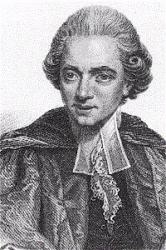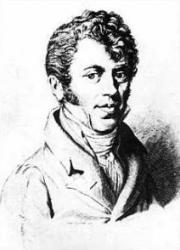Planning worship?
Check out our sister site, ZeteoSearch.org,
for 20+ additional resources related to your search.
- |
User Links
Person Results
Conrad Kocher

1786 - 1872 Arranger of "ELNO" in Carmina Sacra Trained as a teacher, Conrad Kocher (b. Ditzingen, Wurttemberg, Germany, 1786; d. Stuttgart, Germany, 1872) moved to St. Petersburg, Russia, to work as a tutor at the age of seventeen. But his love for the music of Haydn and Mozart impelled him to a career in music. He moved back to Germany in 1811, settled in Stuttgart, and remained there for most of his life. The prestigious Cotta music firm published some of his early compositions and sent him to study music in Italy, where he came under the influence of Palestrina's music. In 1821 Kocher founded the School for Sacred Song in Stuttgart, which popularized four-part singing in the churches of that region. He was organist and choir director at the Stiftskirche in Stuttgart from 1827 to 1865. Kocher wrote a treatise on church music, Die Tonkunst in der Kirche (1823), collected a large number of chorales in Zions Harfe (1855), and composed an oratorio, two operas, and some sonatas. William H. Monk created the current form of DIX by revising and shortening Conrad Kocher's chorale melody for “Treuer Heiland, wir sind hier,” found in Kocher's Stimmen aus dem Reiche Gottes (1838).
Bert Polman
Conrad Kocher
Thoro Harris

1874 - 1955 Composer of "[High in the heav'ns, eternal God]" in Echoes of Paradise Born: March 31, 1874, Washington, DC.
Died: March 27, 1955, Eureka Springs, Arkansas.
Buried: International Order of Odd Fellows Cemetery, Eureka Springs, Arkansas.
After attending college in Battle Creek, Michigan, Harris produced his first hymnal in Boston, Massachusetts, in 1902. He then moved to Chicago, Illinois at the invitation of Peter Bilhorn, and in 1932, to Eureka Springs, Arkansas. He composed and compiled a number of works, and was well known locally as he walked around with a canvas bag full of handbooks for sale. His works include:
Light and Life Songs, with William Olmstead & William Kirkpatrick (Chicago, Illinois: S. K. J. Chesbro, 1904)
Little Branches, with George J. Meyer & Howard E. Smith (Chicago, Illinois: Meyer & Brother, 1906)
Best Temperance Songs (Chicago, Illinois: The Glad Tidings Publishing Company, 1913) (music editor)
Hymns of Hope (Chicago, Illinois: Thoro Harris, undated, circa 1922)
--www.hymntime.com/tch
Thoro Harris
William Tans'ur

1699 - 1783 Person Name: Tansur Composer of "ANGEL'S HYMN" in Carmina Sacra William Tansur, b. about 1700, Dunchurch of Barnes; d. 1783, St. Neots Evangelical Lutheran Hymnal, 1908
Also known as Tansur; Tanzer; le Tansur
William Tans'ur
Henry K. Oliver
1800 - 1885 Person Name: Henry Kemble Oliver Composer of "FEDERAL STREET" in The Cyber Hymnal Henry Kemble Oliver (b. Beverly, MA, 1800; d. Salem, MA, 1885) was educated at Harvard and Dartmouth. He taught in the public schools of Salem (1818-1842) and was superintendent of the Atlantic Cotton Mills in Lawrence, Massachusetts (1848-1858). His civic service included being mayor of Lawrence (18591861) and Salem (1877-1880), state treasurer (1861-1865), and organizer of the Massachusetts Bureau of Statistics and Labor (1867-1873). Oliver was organist at several churches, including Park Street Congregational Church in Boston, North Church in Salem, and the Unitarian Church in Lawrence. A founder of the Mozart Association and several choral societies in Salem, he published his hymn tunes in Hymn and Psalm Tunes (1860) and Original Hymn Tunes (1875).
Bert Polman
Henry K. Oliver
Aleksēi Federovich L'vov

1798 - 1870 Person Name: A. Lwoff Composer of "[High in the heav'ns, eternal God]" in The Assembly Praise Book Alexis Federovich L’vov Estonia 1798-1870. Born at Reval, Estonia, son of the St. Petersburg imperial court chapel director, he learned violin as a child and gave regular concerts in his home at age 9. Studying under a number of teachers until age 19, he then studied independently and developed his own personal style of playing. He entered the Russian army in 1818, became a civil engineer there eventually a General in 1828, when he was appointed Aide-de-camp to Tsar Nicholas I. He married Praskovya Aggeyevna, and they had a son and two daughters. He eventually took over his father’s post after he died in 1837 and stayed at that position for 24 years. He formed a string quartet in St. Petersburg and held weekly concerts at his private residence, which were attended by members of high society, including Franz Liszt, Robert and Clara Schumann, and Berlioz. In charge of the Russian chapel choir, it was described by Berlioz as of exceptional quality, expressing regret that Europeans were unable to hear the extraordinary sounds of the chapel choir (80 singers). L’vov took his quartet on several European tours where he could play to public audiences. He met Mendelssohn, Meyerbeer, and Spontini, who became personal friends. L’vov codified the Russian liturgical musical style ‘Obikhod’, the standard repertory of most Russian Orthodox churches in the world. L’vov was a member of the Russian musical establishment. Two of his friends who attained musical fame were Glinka and Berlioz, both impressed with L’vov’s superb violin playing and composing abilities. He composed violin music, operas and various religious pieces. His opera “Undine” (1846) became famous. In 1850 he founded the Russian Concert Society. His musical style was eclectic, combining traditions of Russian culture with Italian and German influences. He retired in 1867 due to deafness. He died near Kovno, Lithuania.
John Perry
Aleksēi Federovich L'vov
Charles Burney

1726 - 1814 Person Name: Charles Burney (1726-1814) Composer of "TRURO" in Many Voices; or, Carmina Sanctorum, Evangelistic Edition with Tunes A music historian and composer, Burney attended Shrewsbury School and the Free School, Chester. He was apprenticed to Thomas Arne from 1744 to 1746. In 1749, he became organist at St. Dionis’ Backchurch, London. In 1751 moved to King’s Lynn, Norfolk, where he taught and played the organ. His works include:
Music, Men, and Manners in France and Italy, 1770
A General History of Music, from the Earliest Ages to the Present Period (London: 1776-89)
Sources:
Findagrave, accessed 18 Nov 2016
Nutter, p. 454
© The Cyber Hymnal™. Used by permission. (www.hymntime.com)
Charles Burney
R. M. McIntosh

1836 - 1889 Composer of "SUMMERS" in Good News Used Pseudonym: Robert M. McIntosh
==========
Rigdon (Robert) McCoy McIntosh USA 1836-1899 Born at Maury County, TN, into a farming family, he attended Jackson College in Columbia, TN, graduating in 1854. He studied music under Asa Everett in Richmond, VA, and became a traveling singing school teacher. He also served briefly in the Civil War. He wrote several hymns during this period of his life. In 1860 he married Sarah McGlasson, and they had a daughter, Loulie Everett. In 1875 he was appointed head of the Vanderbilt University Music Department in Nashville, TN. In 1877 he joined the faculty of Emory College, Oxford, GA. In 1895 he left Emory College to devote his time to the R M McIntosh Publishing Company. He also served as music editor of the Methodist Episcopal Church South Publishing House for over 30 years. His song book publications include: “Good news” (1876), “Light & life” (1881), “Prayer & praise” (1883), “New life” (1879), “New life #2” (1886), and “Songs of service” (1896). He died in Atlanta, GA.
John Perry
R. M. McIntosh
Robert G. McCutchan
1877 - 1958 Person Name: Robert G. McCutchan, 1877- Composer of "DE PAUW" in The Methodist Hymnal A noted hymnologist, McCutchan studied at Park College, Parkville, Missouri, and Simpson College, Indianola, Iowa (BM 1904). He went on to teach voice at Baker University in Baldwin, Kansas, and founded the conservatory of music there in 1910. After further study in Germany and France, in 1911 he became dean of music at DePauw University in Greencastle, Indiana, serving there 26 years. He helped compile the Methodist Hymnal in 1936. His works include:
Better Music in Our Churches, 1925
Music in Worship, 1927
American Junior and Church School Hymnal, 1928
The Deluge of New Hymnals (reprint from M.T.N.A. Proceedings, 1933)
American Church Music Composers of the Early Nineteenth Century, Church History, September 1933
The Congregation’s Part in the Office of Music Worship (Northwestern University, 1934)
Our Hymnody (New York: The Methodist Book Concern, 1937)
Aldersgate, 1738-1938, 1938
Hymns in the Lives of Men (New York: Abingdon-Cokesbury Press, 1943)
Hymns of the American Frontier, 1950
Hymn Tune Names: Their Sources and Significance, 1957
Sources:
Erickson, pp. 341-42
Hughes, p. 478
Hustad, pp. 284-85
McCutchan, p. 33
--http://www.hymntime.com/tch/bio/m/c/c/mccutchan_rg.htm, 03 July 2014.
Robert G. McCutchan
Sigismund Neukomm

1778 - 1858 Person Name: S. Neukomn Composer of "AMES" in Christ in Song Sigismund Ritter von Neukomm, b. Salzburg, 1778; d. Paris 1858
Evangelical Lutheran Hymnal, 1908
Sigismund Neukomm
Israel Holdroyd
1690 - 1753 Person Name: I. Holdroyd Composer of "WELLS" in The New Jubilee Harp Holdroyd was both a composer and publisher of psalmody; his chief collection:
Spiritual Man's Companion, 1746
--www.hymntime.com/tch
Israel Holdroyd


 My Starred Hymns
My Starred Hymns

